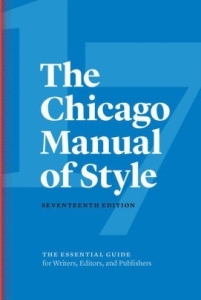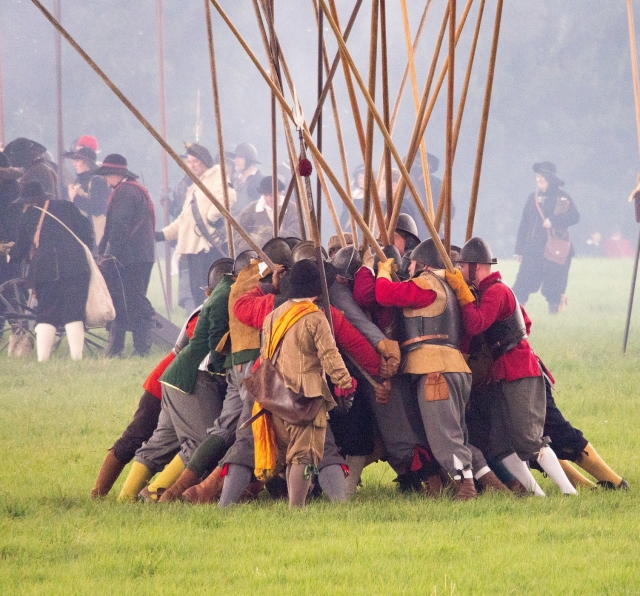The English language is a warzone, with all sorts of people fighting over what they think is right and wrong. But when it comes to spelling, like in so many other matters, there isn’t necessarily only one way of doing things.
Be Your Own Copy Editor #12
 You might not have noticed, but there was a huge ripple in the editing universe a couple of months ago: The Chicago Manual of Style, the arbiter of style in US book circles, published a new edition – its seventeenth since its inception in 1906. Now, I work for US publishers a lot, so what Chicago has to say matters to me a great deal in my work, and my latest book projects have come with a document summarising the relevant changes in the new edition. And lo, the style bible said that ‘Internet’ was no longer good, but that ‘internet’ shall be written in its place, without an initial capital letter, and that ‘e-mail’ was no longer good either, and that henceforth it shall be written as ‘email’, without a hyphen. And lo, the people thought it was good! According to the online edition of the Washington Post, the de-hyphenated spelling ‘email’ got cheers at a copy editors’ convention. You can imagine the scene: high fives, fist pumps, shouts of ‘Woohoo! In your face, hyphen! Get back to the nineteenth century, where you belong!’ Yes, it was good.
You might not have noticed, but there was a huge ripple in the editing universe a couple of months ago: The Chicago Manual of Style, the arbiter of style in US book circles, published a new edition – its seventeenth since its inception in 1906. Now, I work for US publishers a lot, so what Chicago has to say matters to me a great deal in my work, and my latest book projects have come with a document summarising the relevant changes in the new edition. And lo, the style bible said that ‘Internet’ was no longer good, but that ‘internet’ shall be written in its place, without an initial capital letter, and that ‘e-mail’ was no longer good either, and that henceforth it shall be written as ‘email’, without a hyphen. And lo, the people thought it was good! According to the online edition of the Washington Post, the de-hyphenated spelling ‘email’ got cheers at a copy editors’ convention. You can imagine the scene: high fives, fist pumps, shouts of ‘Woohoo! In your face, hyphen! Get back to the nineteenth century, where you belong!’ Yes, it was good.
Unless you disagree with the changes, of course, which, the English language basically being a battlefield, obviously people do. In that case it was bad. Really bad, according to one Bad Hambre, who left a comment at the foot of the Washington Post review of the new edition: ‘I will continue using the hyphen in the word “e-mail”. I guess it is a way of sticking my tongue out at the world of self-appointed grammar police.’ Similarly, Dogless Infidel commented that they wouldn’t be lower-casing ‘Internet’. ‘There is only one Internet,’ they wrote. ‘It’s a proper noun. So I’m going to continue capping it until it somehow becomes a generic term, or until I retire, whichever comes first.’ (Not sure that act of defiance makes sense, actually. Surely in the freedom and anarchy of retirement you can cap ‘Internet’ till your Shift key wears out, but whatever.)

Meanwhile, the online version of Merriam-Webster’s Collegiate Dictionary still gives ‘Internet’ with an initial cap but notes that the all-lower-case spelling is gaining ground. ‘E-mail’ is the spelling of the term when a noun, but it can either be ‘e-mail’ or ‘email’ when it’s used as a verb, according to M-W.
So where does this leave the fiction writer writing in American English? Should you be writing ‘e-mail’ or ‘email’, ‘internet’ or ‘Internet’? The truth is, on this and many other subjects relating to written English, there is no single right way of doing things, even though a lot of people will tell you otherwise – something which I find incredibly tedious. Let’s embrace pluralism, people. If you want to write ‘email’, that’s fine, as is ‘e-mail’; if you want to write ‘Internet’, that’s fine too, as is ‘internet’. And none of those spellings suddenly became acceptable or unacceptable on publication of the newest edition of The Chicago Manual of Style. Some words have more than one acceptable spelling, and as a fiction writer, you’re likely to be a highly sophisticated user of the English language who can make good choices on spelling and lots of other matters. The key is to choose one and use it consistently — unless you have a good reason to be inconsistent, which you conceivably might, in which case you should be consistent in your inconsistency.
When a copy editor copyedits a novel for a publisher, they are asked to follow the guidance of recognised authorities on style and spelling. For the US publishers I work for, those authorities are The Chicago Manual of Style and Merriam-Webster’s Collegiate Dictionary. Publishers also have a house style guide, and that will list spellings favoured by the publishing house that are different from those given in their preferred style guide and dictionary. So the publisher stamps a little individuality on spelling choices, and that licence is also given to authors. Authors can choose to use variant spellings, as long as they are within the acceptable range, and their variant spelling choices are listed on the individual style sheet created for their novel – yes, every novel gets its own style sheet.
When you’re self-editing your novel, you should do the same. Choose a dictionary and style guide to follow – if you’re writing in British English, not American, then you could use either Collins or Oxford as your dictionary, and New Hart’s Rules as your style guide – but then create an individual style sheet, listing any spellings you want to use that are different from those favoured by the dictionary and style guide but are nevertheless regarded as acceptable.
The key, as I said, is consistency. It can be distracting for the reader to see you using a couple of different spellings of the same word, so avoid doing that.
Self-Editing Checklist
- Decide which dictionary and style guide you are going to follow (more or less).
- If you have any flicker of a doubt about a spelling, look it up. Looking stuff up is so easy these days, since dictionaries have excellent online versions.
- If you want to use a legitimate variant spelling, be confident in your choice. Make a note of the spelling, preferably in a style document that you’ve created for your novel, and make sure you use it consistently throughout your manuscript.
Words: © Marcus Trower 2017. Feel free to e-mail me an email, or email me an e-mail, via the Internet, or even using the internet, with questions about any editing issues you’re having while working on your novel. Send a message to mbtrower @ yahoo dot co dot uk


